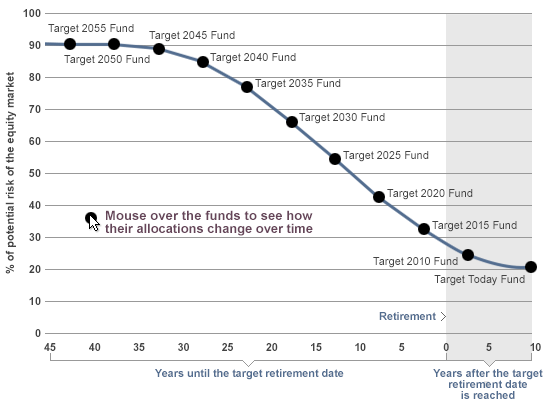The Target Date Fund
Post on: 18 Август, 2015 No Comment

Posted on Mar 14, 2011 in Investing | Comments Off
Many 401(k) and 403(b) plans include Target Date Fund choices. These generally list the fund company, a year (somehow related to your retirement year), and some kind of reference to Target Date or a brand name such as Freedom Fund, Fidelitys target date funds. There are some pros and cons to these funds, and some things you should know before you use them in your investment portfolio. In this blog, Ill describe some of the pros and cons of target date funds.
Pros:
1. Theyre on autopilot. You dont have to worry about rebalancing or adjusting your allocation; thats all done for you. For younger participants, equity exposure can be 85% or even more of the total invested fund. As the target date gets closer, the fund allocation automatically adjusts and may add more retirement-appropriate investments such as inflation-protected bonds, and may focus more on short-term bonds rather than longer-term bonds. In general Target Date funds tend to get increasingly bond-allocated over time, presumably to provide more stability.
The automatic nature of the Target Date fund is to me one of its most attractive features. It can be particularly well suited to young, starting investors who are saving most of their money into a tax deferred option and simply want a strategy thats appropriate to their time horizon.
2. You may only need to pick one fund. Target Date funds generally come in five year increments: for example, a Target Date fund from Fidelity will have the name Fidelity Freedom 20XY Fund, where XY is divisible by 5. If you plan to retire in 2021, you would most likely pick the Fidelity Freedom 2020 fund, which Fidelity says is designed for investors expecting to retire around the year 2020.
If youre comfortable that youre getting broad exposure international equities, short and intermediate term bonds, and various capitalization levels for corporate equities you may just need one target date retirement fund in your 401(k).
But Target Date funds arent for every situation. Here are some cons:
1. Theyre on autopilot. Hmmm I thought this was a pro! Well, it is, and it isnt. Consider if you wanted to go to California and your plane was on autopilot to New York In other words, you need to ensure that your target date fund will take you where you want to go! For example, some Target Date funds include such investments as High Yield bonds allocated to the assumed safe Bond part of the allocation. Bonds may have longer maturity dates than you might find desirable. When you buy the Target Date fund, youre buying the allocation each company selects. Make sure youre aware of whats in each fund and know that the investments are appropriate to your situation.
One approach to test the asset allocation in your Target Date fund is to come up with your own investment strategy, and then see how close the Target Date comes to selecting your desired asset classes and the proportion of those assets. For help developing an asset allocation strategy, see Richard Ferris book, All About Asset Allocation , or other asset allocation resources.
2. They can be pricey. As with most mutual funds, you need to check for fees. Vanguards Target Retirement funds have annual fees of .18%, whereas the Oppenheimer version may have annual fees of up to 2.2% when sales fees are included. One of the problems with these funds inside of employer plans is that employees generally only have one fund companys target date funds to select, so they may have to decide if they want to trade off convenience for fees.
3. They dont allow flexibility when taking withdrawals. One of the values of diversification is that withdrawals can be taken from asset classes that are currently overvalued. However, withdrawals from a target date fund come pro-rata from each of the represented asset classes. I see the one-fund approach as having reduced applicability as you reach retirement age and the need to withdraw from your retirement assets.
4. They dont allow for tax management. Youd generally like to hold equities in your taxable accounts and bonds in your tax-deferred accounts (at least, as federal taxes in the United States stand as of this writing). Holding a single fund eliminates your potential to tax-manage your accounts in this way. As noted above, this is OK if all of your assets are in tax-deferred accounts; but not if you have a significant amount of taxable savings.
Those are just a few of the pros and cons of target date funds. As noted, these funds do have a specific place in the world of saving for retirement, but may not be the best approach for everyone.














